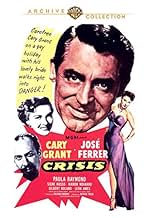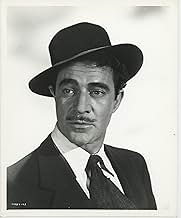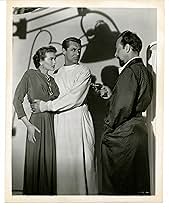De vacaciones en un país latinoamericano, un neurocirujano estadounidense y su esposa se ven envueltos en un levantamiento revolucionario contra un dictador tiránicoDe vacaciones en un país latinoamericano, un neurocirujano estadounidense y su esposa se ven envueltos en un levantamiento revolucionario contra un dictador tiránicoDe vacaciones en un país latinoamericano, un neurocirujano estadounidense y su esposa se ven envueltos en un levantamiento revolucionario contra un dictador tiránico
- Dirección
- Guionistas
- Elenco
- Premios
- 1 premio ganado en total
José Ferrer
- Raoul Farrago
- (as Jose Ferrer)
Lillian Adams
- Nurse
- (sin créditos)
Carlos Barbe
- Friend of Farrago
- (sin créditos)
Orlando Beltran
- Doctor's Assistant
- (sin créditos)
Audrey Betz
- Servant
- (sin créditos)
George Brady
- Student
- (sin créditos)
Robert Cabal
- Very Young Man
- (sin créditos)
Andy Carillo
- Man at Table
- (sin créditos)
Bridget Carr
- Guest
- (sin créditos)
Teresa Celli
- Rosa Aldana
- (sin créditos)
Carlos Conde
- Man
- (sin créditos)
Rita Conde
- Pretty Woman
- (sin créditos)
- Dirección
- Guionistas
- Todo el elenco y el equipo
- Producción, taquilla y más en IMDbPro
Opiniones destacadas
Cary Grant stars as a famous neurosurgeon who is vacationing in a South American country with his new bride. The pair are subject to a "friendly abduction" when the current president of that country, Raoul Farrago (Jose Ferrer), learns of his presence. You see, the president has a brain tumor, and due to the fact that his country is on the verge of civil war, he dares not travel to another country for the operation he needs to save his life.
Farrago is a tyrant who claims that he must be so because democracy would never work in his country. His people are illiterate children, he says, and wouldn't know what to do with freedom if they had it. However, being a national "father image" doesn't prevent the president from stealing everything in the country that isn't nailed down. The president's wife does a great job of emulating Evita Peron before much was really known about her. Then there is Gilbert Roland as the leader of the opposition. He wants to make his people free, as long as he gets to be the new dictator. Roland does a great job with this role. How far he has progressed here since his early days as an actor at the dawn of sound.
So the question is - does Grant owe a service to the dictator by saving his life with a delicate operation only so that patient can go on being a killer and a thief, or would the death of this tyrant better serve mankind? If you throw the safety of his wife into the balance - what decision does the doctor make?
Farrago is a tyrant who claims that he must be so because democracy would never work in his country. His people are illiterate children, he says, and wouldn't know what to do with freedom if they had it. However, being a national "father image" doesn't prevent the president from stealing everything in the country that isn't nailed down. The president's wife does a great job of emulating Evita Peron before much was really known about her. Then there is Gilbert Roland as the leader of the opposition. He wants to make his people free, as long as he gets to be the new dictator. Roland does a great job with this role. How far he has progressed here since his early days as an actor at the dawn of sound.
So the question is - does Grant owe a service to the dictator by saving his life with a delicate operation only so that patient can go on being a killer and a thief, or would the death of this tyrant better serve mankind? If you throw the safety of his wife into the balance - what decision does the doctor make?
"Crisis" is a study in how a strong supporting cast can make a movie complete. While Grant and Ferrer give powerful performances, they are enhanced by even better performances by Signe Hasso and Ramon Navarro. The latter two, with subtle, understated characterizations, round out a thoughtful script and cast. The story is compelling -- medical/ethical conflict, interwoven with a political drama which doesn't attempt to sway. It does provide a backdrop which doesn't interfere but enhances.
Cary Grant is a noted surgeon traveling with his wife (Paula Raymond) in a Latin American country when there's a "Crisis."
This 1950 black and white film also stars Jose Ferrer, Leon Ames, Ramon Novarro, and Gilbert Roland. Grant, as Dr. Ferguson, and his wife are trying to leave the country due to political unrest when they are kidnapped and brought to the home of the country's dictator, Raoul Farrago (Ferrer).
There, they learn from his wife (Signe Hasso) that the leader is dying of a brain tumor, and options for an operation are few as no one wants him to live. Ferguson agrees on certain conditions.
Ultimately, his wife is involved in a riot, and he sends her home. It isn't until the surgery is over that he learns that certain things have been kept from him.
This is actually a very good and underrated film, not the usual Cary Grant type of role or movie, which in itself should have sparked some interest when it was released.
People know the handsome Grant and his debonair persona, his gift for physical comedy and the way he has with a line - but it's nice to remember occasionally that underneath all that star power and tailored suits there's a fine actor.
Here he plays a man who makes a commitment to a patient he plainly doesn't like, and he has to fight to control his emotions. His anger over the situation makes this difficult.
Ferrer is terrific as a violent man who thinks of his people as dumb children as he feathers his own nest with money that rightfully belongs to them. As his Evita-like wife, Signe Hasso has a chance to show her capabilities, and she's excellent - charming on the surface, worried about her husband, and hard as nails underneath.
Hasso was a wonderful Swedish actress often relegated to B movies or to small roles in A films. Eventually she turned to theater and television. Here we see, had the roles been there for her, what a find she truly was.
It's always great to see old-timers Gilbert Roland and Ramon Novarro, the latter as Colonel Dragon, and the former as a revolutionary who wants Grant to kill Farrago on the operating table. Actually he's no better than Farrago, and Ferguson gets a bird's eye look at oppression politics.
A very good film; worth seeing for Grant, Ferrer and Hasso.
This 1950 black and white film also stars Jose Ferrer, Leon Ames, Ramon Novarro, and Gilbert Roland. Grant, as Dr. Ferguson, and his wife are trying to leave the country due to political unrest when they are kidnapped and brought to the home of the country's dictator, Raoul Farrago (Ferrer).
There, they learn from his wife (Signe Hasso) that the leader is dying of a brain tumor, and options for an operation are few as no one wants him to live. Ferguson agrees on certain conditions.
Ultimately, his wife is involved in a riot, and he sends her home. It isn't until the surgery is over that he learns that certain things have been kept from him.
This is actually a very good and underrated film, not the usual Cary Grant type of role or movie, which in itself should have sparked some interest when it was released.
People know the handsome Grant and his debonair persona, his gift for physical comedy and the way he has with a line - but it's nice to remember occasionally that underneath all that star power and tailored suits there's a fine actor.
Here he plays a man who makes a commitment to a patient he plainly doesn't like, and he has to fight to control his emotions. His anger over the situation makes this difficult.
Ferrer is terrific as a violent man who thinks of his people as dumb children as he feathers his own nest with money that rightfully belongs to them. As his Evita-like wife, Signe Hasso has a chance to show her capabilities, and she's excellent - charming on the surface, worried about her husband, and hard as nails underneath.
Hasso was a wonderful Swedish actress often relegated to B movies or to small roles in A films. Eventually she turned to theater and television. Here we see, had the roles been there for her, what a find she truly was.
It's always great to see old-timers Gilbert Roland and Ramon Novarro, the latter as Colonel Dragon, and the former as a revolutionary who wants Grant to kill Farrago on the operating table. Actually he's no better than Farrago, and Ferguson gets a bird's eye look at oppression politics.
A very good film; worth seeing for Grant, Ferrer and Hasso.
I first saw this movie in 1950 when it was released. I thought it was a good drama, more or less accurately portraying many of the problems of Latin American governments, with good dialog particularly between the two male leads. Incidentally, I did not find either character particularly sympathetic, but no matter. Many of the comments here have mentioned the resemblance to Eva Peron of the Signe Hasso character. Just an interesting observation: In the much later made for TV movie, Evita Peron, Signe Hasso and Jose Ferrer both had roles. He was the tango singer who seduced Evita and took her to Buenos Aires. She was the aging actress who befriended the young Dva Duarte and found herself in a jail cell. Of the two movies, Crisis is by far the better film. Evita Peron was a ripoff.
This is Richard Brooks' first directorial effort. Examining the work half a century after it was made, the film presents a director who knows how to get the most from his actors through the written word and the way it is spoken. Three actors sparkle: Cary Grant, Jose Ferrer, and Signe Hasso.
Compare Cary Grant's acting in the Hitchcock vehicles and in this. Grant presents a maturity in his speech patterns that do not show up under Hitchcock's direction. I think much of the quality of the performances is probably due to the director who took his first film seriously--probably a lot more than he did in his later career.
All in all, this is a curious film--quite unusual in several ways compared to the average Hollywood products in the Fifties. Is it only a question of humanism winning over all evils? Or more?
Compare Cary Grant's acting in the Hitchcock vehicles and in this. Grant presents a maturity in his speech patterns that do not show up under Hitchcock's direction. I think much of the quality of the performances is probably due to the director who took his first film seriously--probably a lot more than he did in his later career.
All in all, this is a curious film--quite unusual in several ways compared to the average Hollywood products in the Fifties. Is it only a question of humanism winning over all evils? Or more?
¿Sabías que…?
- TriviaOriginally banned in Mexico, Central and South America.
- ErroresThe doctor announces his fee is ten percent of the patient's income, but does not say whether this means monthly, annual or some other period.
- Citas
Raoul Farrago: At least permit me to thank you. You have done a great service not only to me but to the people of my country.
Dr. Eugene Norland Ferguson: I only saved your life I didn't vote for you.
Raoul Farrago: Neither did they.
[smiling]
- Créditos curiososPROLOGUE: "The time is now. The scene of the action is fictitious, but the forces at play in this story are not fictitious."
- Versiones alternativasAlso available in a computer colorized version.
- ConexionesReferenced in Secret Publicity - Forbes Taylor Remembers the Making of State Secret (2021)
Selecciones populares
Inicia sesión para calificar y agrega a la lista de videos para obtener recomendaciones personalizadas
- How long is Crisis?Con tecnología de Alexa
Detalles
Taquilla
- Presupuesto
- USD 1,616,455 (estimado)
- Tiempo de ejecución1 hora 35 minutos
- Color
- Relación de aspecto
- 1.37 : 1
Contribuir a esta página
Sugiere una edición o agrega el contenido que falta

Principales brechas de datos
By what name was Crisis (1950) officially released in India in English?
Responda
































